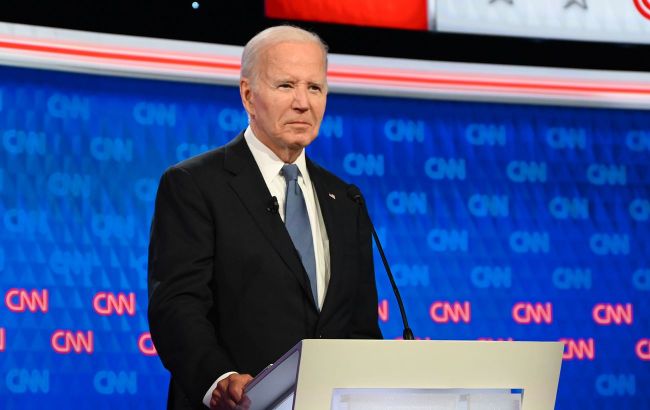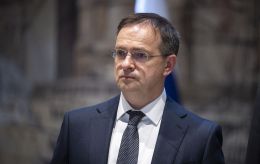How Biden-Trump debate to sway 2024 presidential election: Key takeaways
 US President Joe Biden (Phoro: Getty Images)
US President Joe Biden (Phoro: Getty Images)
Joe Biden's team's gamble on the presidential debates did not pay off—the current head of state only worsened his re-election chances. RBC-Ukraine provides detailed information on what Joe Biden and Donald Trump said and the possible consequences below.
Contents
- How Biden performed in the debate
- How Trump performed in the debate
- Could Biden drop out of the race
Many American media outlets hailed them as "the most important in American history." This unprecedented label was a testament to the upcoming November presidential election, which could usher in a significant shift in US policy, a change not witnessed in recent history.
Joe Biden's team had reasons for considering these debates "the most important" – his presidential campaign was unsuccessful. A head-to-head confrontation with Donald Trump on live television and in front of all of America seemed like a perfect opportunity to turn the tide in his favor.
In reality, Biden needed to accomplish two tasks. The first was to vividly portray his opponent as an aggressive and unstable individual who cannot control himself, lies constantly, and poses a danger to the country. The second was to dispel doubts about his poor physical condition, demonstrating energy and clarity of mind, proving that age is not an obstacle. Unfortunately, neither of these tasks was accomplished. In fact, quite the opposite.
How Biden performed in the debate
In the days leading up to the debate, American media extensively covered how the president was preparing. He virtually disappeared from public view, spending all his time with his advisors: they drafted key points, devised comebacks and jabs at Trump, analyzed how to counter his attacks, and conducted mock debates with someone from Biden's team acting as his opponent.
Despite these preparations, it didn't work out well. A few times, Biden managed to land strong blows on his opponent – for instance, when discussing Trump's legal issues or referencing the storming of Congress by Trump supporters in early 2021.
However, Biden often appeared unconvincing, especially when he struggled to recall some pre-prepared "zingers" – candidates were forbidden from using notes, relying solely on memory. In his initial responses, he heavily relied on numbers (an obvious tactic to show mental clarity), but soon mixed up billionaires with trillionaires.
At times, he completely lost his train of thought while trying to finish a point or jumped from topic to topic within a single answer. "we're able to make every single solitary person eligible for what I've been able to do with the – with – with – with the COVID. Excuse me, with dealing with everything we have to do with – look, if – we finally beat Medicare (the US health insurance system)," – this statement by Biden is currently being heavily discussed in American social media.
Adding to this was Biden's hoarse, breaking voice (Biden's team quickly spread a rumor that the president had a cold) – making his performance appear unconvincing.
Even if, in some topics, he substantively outperformed Trump, the audience remembers the debates primarily by the "picture." And literally. The directors of the CNN broadcast frequently showed a split screen: one candidate speaking in close-up, the other listening. During Trump's speeches, Biden often stood frozen, his mouth slightly open, and he had a vaguely worried expression.
Of course, Biden did not make any glaring mistakes—he occasionally does—but he also failed to create the impression of a vigorous, youthful politician, instead fueling rumors about his condition.
Notably, Biden spoke five minutes less than his opponent, usually not using up his allotted two minutes for a response or one minute for a reaction. When the moderators reminded him of the remaining time, it sometimes seemed like Biden had nothing more to say – again, not the best impression for an incumbent president seeking a second term.
How Trump performed in the debate
The Republican candidate learned lessons from the debates four years ago, where aggressive behavior was generally deemed unhelpful. According to the rules, the other's microphone was turned off while one candidate was speaking to prevent interruptions. Naturally, if Trump wanted, no regulations would have stopped him. But he deliberately did not turn the debate into a no-holds-barred fight and calmly waited for his turn to speak.
As expected, Trump focused more on personal attacks. According to the New York Times, he spent 41% of his time attacking Biden (Biden attacked Trump 36% of the time).
Trump commented on all topics in his usual style: during his presidency, everything was at its best, and under Biden – at its worst, with no shades of gray. For instance, Trump claimed that the American economy showed the best results during his term, that there was no terrorism, and that the environmental situation was the best. Conversely, according to Trump, under Biden, American veterans are living on the streets, Democrats kill babies right after birth, America is destroyed, and Biden takes money from the Chinese.
One of the most important phrases for Ukraine was Trump's statement that he does not support the Kremlin's conditions for ending the war. But this was said in passing, under pressure from the moderators. Trump quickly launched into his usual discourse that Russia invaded Ukraine because of Biden, and he would quickly end the war (without specifying how).
Overall, foreign policy occupied the same place in the debate as it does in the American election agenda: certainly not the last, but far from the top of the list.
American websites already contain analyses debunking Trump's statements on all topics with facts and figures. Unfortunately for Biden, such fact-checking not only fails to convince Trump's core electorate (instead strengthening their belief that all media is sold out to the Democrats) but also has little impact on less stable voters. Trump wins over the public not with facts and knowledge but with emotion.
In this sense, he performed as usual, saying and acting as expected, perhaps even too restrained – aiming at the swing voters put off by his impulsiveness. And if Biden had not failed his part, the debate would have ended roughly in a draw.
However, according to a CNN poll, 67% of Americans (much more than the number of Republican Party supporters) recognized Trump as the debate winner.
Could Biden drop out of the race
From the first minutes of the debate, there was a slight panic in the Democratic segment of American social media – it became evident that Biden looked very unconvincing. Soon, sources in leading media within the Democratic Party began to share similar thoughts. Even Vice President Kamala Harris, who was hurriedly sent on CNN to save the situation, had to admit that "it [Biden's performance] was the slow start."
Of course, the impact of the debates on Trump and Biden's ratings remains to be seen. Still, immediately after their conclusion, talks began in the Democratic camp about needing to change the candidate for the election—such a Biden would not defeat Trump. Some prominent party members even speak about it publicly.
Among the potential replacements for Biden as a candidate, whose names are already being mentioned in the media: California Governor Gavin Newsom, Michigan Governor Gretchen Whitmer, former Speaker of the House Nancy Pelosi, Senate Democratic Leader Chuck Schumer, and others. At some point, the name of former First Lady Michelle Obama might emerge. Publicly, none of the potential candidates have announced their intentions – all who have been asked so far declare full loyalty to Biden.
The problem is that almost no time left to replace the candidate—the primaries have long ended, and Biden won in all states. In August, the Democratic National Convention is set to nominate him as the candidate.
The only scenario is if Biden voluntarily decides to drop out of the race. Then, a fierce battle for the right to be nominated as the candidate could unfold at the convention. For now, this seems unlikely—Biden's entourage has always emphasized his ironclad confidence that he alone can defeat Trump.
However, the Democrats' problem is that changing candidates may not help them either. Throughout Biden's presidency and especially in the last year as the campaign gained momentum, the party has stubbornly assured Americans that Biden is the ideal candidate, is in good health, has a sharp mind, and, again, is the only one who can defeat Trump – and suddenly it turns out that this is not the case.
However, these talks about a possible replacement for Biden are unlikely to stop. "Our only hope is that he bows out, we have a brokered convention, or dies. Otherwise, we are f**king dead," a Democratic Party major donor advisor told POLITICO.
Of course, Biden's campaign team is still hoping for a miracle—that their candidate will transform by the second debate in September and Trump, on the contrary, will lose ground. But so far, there are no signs of this happening.
Sources: speeches by Joe Biden and Donald Trump during the debate, data from the New York Times, Washington Post, POLITICO, CNN, and VOX.

